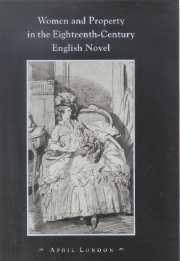Book contents
- Frontmatter
- Contents
- Acknowledgements
- Introduction
- PART I SAMUEL RICHARDSON AND GEORGIC
- Introduction
- 1 Clarissa and the georgic mode
- 2 Making meaning as constructive labor
- 3 Wicked confederacies
- 4 “The work of bodies”: reading, writing, and documents
- PART II PASTORAL
- PART III COMMUNITY AND CONFEDERACY
- PART IV THE POLITICS OF READING
- Epilogue
- Notes
- Bibliography
- Index
3 - Wicked confederacies
Published online by Cambridge University Press: 14 October 2009
- Frontmatter
- Contents
- Acknowledgements
- Introduction
- PART I SAMUEL RICHARDSON AND GEORGIC
- Introduction
- 1 Clarissa and the georgic mode
- 2 Making meaning as constructive labor
- 3 Wicked confederacies
- 4 “The work of bodies”: reading, writing, and documents
- PART II PASTORAL
- PART III COMMUNITY AND CONFEDERACY
- PART IV THE POLITICS OF READING
- Epilogue
- Notes
- Bibliography
- Index
Summary
Clarissa's father responded to her elopement from Harlowe Place by leveling a curse at her. Toward the end of her life, she returns repeatedly to the accuracy of his prediction “that [she] may meet [her] punishment, both here and hereafter, by means of that very wretch in whom [she has] chosen to place [her] wicked confidence” (509). In fact, her punishment is effected by Lovelace not alone but in concert with Sinclair and her women, that “wicked confederacy” (825) that Clarissa envisions as dedicated to her destruction and whom Judith Wilt argues participate actively in the rape. The collaborative rape also confirms James Harlowe's Georgics allusion, amor omnibus idem, in two complementary ways. In the first place, the complicity of both sexes in the working out of the curse speaks to the accuracy of his assertion of a universal sexuality. In the second, it serves to conflate those who foretell her fate – father and son – with those who enact it. Clarissa will later strengthen the Harlowe/harlot link by extending the notion of confederacy beyond its earlier exclusive denomination of the Sinclair group. Writing to Mrs. Norton, she condemns in similar terms the collective leaguing against her evident in the Harlowes' “strong confederacy … (a strong confederacy indeed!), against a poor girl, their daughter, sister, niece” (1168).
Clarissa's final willingness to indict her family for reneging on their given relationships with her as daughter, sister, and niece marks her release from the guilty sense that she in her own person affords proof of James's allusion to sexual appetite as “in all the same.”
- Type
- Chapter
- Information
- Publisher: Cambridge University PressPrint publication year: 1999

